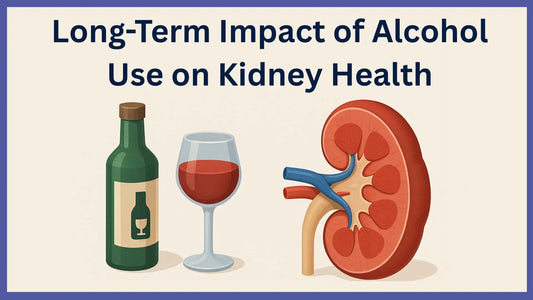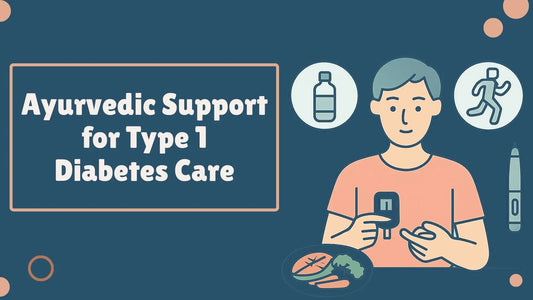
The Long-Term Impact of Alcohol Use on Kidney Health
The kidney plays an important role in filtering toxins and waste from the body. It eliminates the excess fluids from the body through urine and regulates the blood pressure and keeps your body’s electrolytes balance.
When alcohol consumption becomes a habit, especially in excessive amounts, it can gradually affect on kidneys and their functions.
Here, we’ll learn about the long-term effects of alcohol on the kidneys so that you can protect your kidneys from alcohol-related diseases, whether it's acute or chronic.
How Do Kidneys Work?
It’s important to understand what your kidneys do.
-
Filter about 120–150 quarts of blood every day to produce 1–2 quarts of urine.
-
Remove wastage like urea and ammonia.
-
Balance electrolytes such as sodium, potassium, and calcium.
-
Regulate fluid levels in the body.
-
Control blood pressure.
-
Produce hormones that form red blood cells and keep bones healthy.
Each of these functions can be disrupted if drinking becomes chronic or excessive.
The Long-Term Effects of Alcohol on the Kidneys
Alcohol affects the kidneys in many ways, out of which we have explained to you below:
1. Risk of Chronic Kidney Disease (CKD)
Chronic Kidney Disease is a condition that occurs from excessive alcohol drinking, where kidneys are not able to filter blood properly and build the extra fluids in the body that can damage the kidneys in the long term. The diseases include:
-
high blood pressure, and
-
Glomerulonephritis
Once you develop these chronic diseases, you are not able to cure them. The treatment will be only for managing, slowing down the progression, and transplanting in advanced cases.
2. High Blood Pressure and Kidney Damage
When you drink alcohol in excess, it raises blood pressure or increases the risk of hypertension that can affect you in the long term.
Due to high blood pressure, the blood vessels of the kidney become damaged and are unable to function properly. That’s why doctors recommend limiting or stopping alcohol consumption because even moderate drinking can affect blood pressure.
The American Heart Association recommends, no more than 2 drinks for men and 1 drink for women per day must not be taken.
3. Dehydration
When you drink alcohol, it encourages your body to lose more water than you need. This process can make you dehydrated and places constant stress on your kidneys.
Without enough water, your kidneys can’t flush out toxins as effectively, and build the waste in the body. It can cause chronic dehydration.
4. Electrolyte Imbalance
Alcohol disrupts the levels of electrolytes like
-
sodium
-
calcium
-
potassium, and
-
magnesium.
These work in various bodily processes, including nerve and muscle function, hydration, and maintaining a healthy heart rate.
An electrolyte imbalance occurs when the levels of electrolytes in your body are either too high or too low, which disrupts the body's normal function.
Electrolyte imbalances or poor electrolytes can lead to a range of symptoms such as
-
mild fatigue and
-
muscle cramps
-
irregular heartbeat, or
-
even seizures
Over time, these repeated imbalances make the kidneys more prone to damage and infection.
5. Kidney Stones, Pain & Infection
Kidney stones and infections are among the common alcohol effects on kidneys. It happens due to frequent drinking that causes dehydration and gathers minerals in urine, like
-
calcium oxalate,
-
calcium phosphate,
-
uric acid, and
-
struvite
These minerals clump together and form painful stones that block the urinary tract and develop UTI infections.
If kidney infections spread upward to the body then it can cause pyelonephritis which can scar kidney tissue and permanently reduce function.
6. Impaired Filtration
To filter waste from the blood and maintain a balance of fluids and electrolytes in the body, is the primary work of the kidneys.
Each kidney has around one million tiny filtering units called nephrons. Excessive alcohol can damage these nephrons, reducing their ability to filter waste properly and build up extra fluid in the bloodstream.
Once your filtration capacity is reduced, it becomes very difficult for the kidneys to function like before, even if a person stops drinking alcohol, permanent damage can occur.
7. Acute Kidney Injury
Acute kidney injury (AKI) is a condition in which the kidneys suddenly lose their ability to filter waste. It usually happens when a large amount of alcohol is consumed in a short time, and it causes:
-
rapid dehydration,
-
blood pressure fluctuations,
-
breakdown of muscle tissue (a condition called rhabdomyolysis)
In fact, AKI can develop within hours or days if untreated and can be life-threatening.
Although the kidneys can recover from AKI with quick medical care. But these repeated triggers can weaken the kidneys and increase the chance of long-term kidneys damage.
8. Kidney Failure
Kidney failure is the final stage of alcohol effects on kidneys. When kidneys are unable to filter waste or balance fluids for longer. It happens due to continued use of alcohol for years without intervention, and it is also called end-stage renal disease (ESRD).
People with kidney failure require dialysis several times a week to survive, or they may need a kidney transplant if they are eligible.
Chronic heavy drinking doesn’t just damage the kidneys directly, it contributes to high blood pressure, diabetes, and liver failure first, then it affects kidney shutdown. Once you develop it, the damage is permanent now.
9. Alcoholic cirrhosis or hepatitis
Alcoholic cirrhosis or hepatitis is a severe condition caused by long-term, excessive alcohol consumption.
It occurs when healthy liver or kidney tissue is replaced by scar tissue and loses its ability to function properly.
This tissue's scarring, also known as fibrosis that can lead to cirrhosis and failure of your liver and kidneys, the final stage of alcoholic disease.
Can Alcohol Affect Kidneys Permanently?
Yes. While occasional or moderate drinking does not cause long-term damage, but chronic excessive drinking can cause irreversible kidney damage or even kidney failure.
Once kidney function drops significantly, the damage usually can’t be reversed, and patients may need dialysis or a kidney transplant.
Symptoms of the long-term effects of alcohol on the kidneys
Watch out for alcohol and chronic kidney disease warning signs if you drink regularly:
-
Swelling in hands, feet, or face
-
Changes in urination (more frequent, painful, or foamy)
-
Fatigue and weakness
-
High blood pressure
-
Unexplained nausea or vomiting
If you notice these symptoms, consult a doctor promptly.
How to Protect Your Kidneys From Alcohol
You may know that alcohol affects kidneys, if you choose to drink. Here’s how you can reduce the risks:
-
Stick to moderate drinking guidelines: no more than one drink a day for women and two for men.
-
Drink plenty of water to prevent dehydration.
-
Avoid binge drinking.
-
Monitor your blood pressure and sugar levels.
-
Get regular kidney function tests if you drink frequently.
-
Seek help if you struggle to cut back—alcohol dependency is treatable.
Final Thoughts
After knowing that alcohol affects kidneys, it becomes important to stop your daily drinking habit. Otherwise, it can worsen your kidneys and their functions.
While an occasional drink may not cause much harm for some people. But still staying aware of the long-term effects of alcohol on the kidneys can prevent you from future health issues.
References
- Epstein, M. (1997). Alcohol's impact on kidney function. Alcohol Health & Research World, 21(1), 84–92.
- Fan, Z., Yun, J., Yu, S., Yang, Q., & Song, L. (2019). Alcohol consumption can be a "double-edged sword" for chronic kidney disease patients. Medical Science Monitor, 25, 7059–7072. Published September 20, 2019. Retrieved from: https://doi.org/10.12659/MSM.916121
- Lee, Y. J., Cho, S., & Kim, S. R. (2021). Effect of alcohol consumption on kidney function: Population-based cohort study. Scientific Reports, 11(1), 2381. Published January 27, 2021. Retrieved from: https://doi.org/10.1038/s41598-021-81777-5

Dr. Hindika Bhagat
Dr. Hindika is a well-known Ayurvedacharya who has been serving people for more than 7 years. She is a General physician with a BAMS degree, who focuses on controlling addiction, managing stress and immunity issues, lung and liver problems. She works on promoting herbal medicine along with healthy diet and lifestyle modification.



